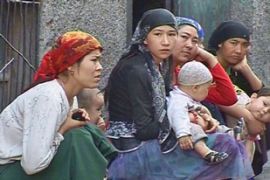China ‘arrests Xinjiang plotters’
“Hardcore terrorists” planned attacks during last year’s unrest, officials say.

Although he did not specify what countries they fled to, he said three of those whose arrest was announced on Thursday were among a group of Uighurs deported back to China in December.
Cambodia repatriated 20 Uighurs in December, saying they had entered the country illegally, but it was not clear if any of them were those referred to by Wu.
Wu did not disclose any dates of the arrests and or any reason for why his statement was issued now.
‘Politically motivated’
Dilxat Raxit, a spokesman for the World Uighur Congress, which is based in Europe, said the timing of Wu’s announcement was politically motivated.
| IN depth | ||||||||
|
“Announcing this now just before July 5 [the anniversary of the ethnic unrest] shows China wants to push the perception that all Uighurs and all Muslims are terrorists,” Raxit told the AFP news agency.
Raxit has also told The Associated Press news agency that “China associates all Uighur causes with the ETIM, although no one seems to know what this group is or where they are located”.
Among those detained were the group’s alleged ringleaders who are accused of launching attacks against against police and paramilitary troops around the time of the Beijing Olympic Games in 2008.
Wu said those who fled last July had subsequently travelled through China preaching religious “extremism”, recruiting members, raising funds, and rehearsing further planned attacks.
Xinjiang tensions
Simmering tensions between Han Chinese migrants and the Turkic-speaking majority Muslim Uighurs over the government’s allegedly discrimnatory policies spilled over into violence that left at least 200 people dead.
However, many analysts have said that ETIM is significantly less influential in the western region than the Chinese government suggests.
Nicholas Bequelin, a senior Asia researcher for Human Rights Watch and an authority on Xinjiang, said there were some in region advocating violence but that links between individual acts were likely limited.
“It mostly looks like these events [in Kashgar and Kuqa] were the product of very heavy pressure ahead of the Olympic Games prompting people to try and bring attention to the situation in Xinjiang,” he said.
“But it doesn’t mean there is a link behind them, the only link to me is that the government has a theory that it faces separatist, extremist, terrorist groups and lumps it all together to make it look like it’s a conspiracy.”